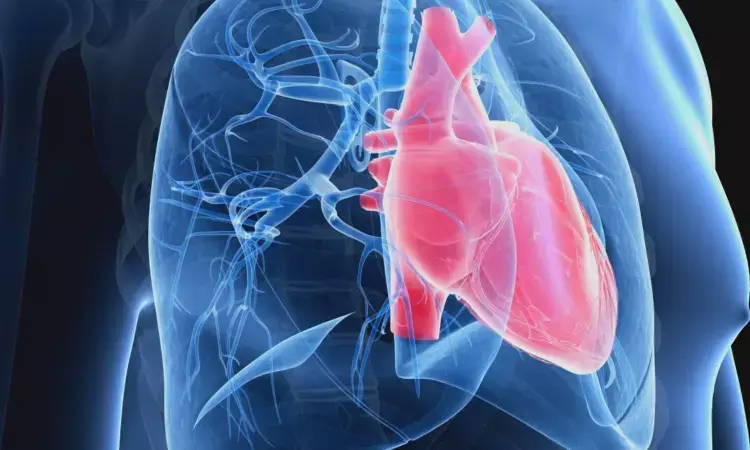- Home
- Medical news & Guidelines
- Anesthesiology
- Cardiology and CTVS
- Critical Care
- Dentistry
- Dermatology
- Diabetes and Endocrinology
- ENT
- Gastroenterology
- Medicine
- Nephrology
- Neurology
- Obstretics-Gynaecology
- Oncology
- Ophthalmology
- Orthopaedics
- Pediatrics-Neonatology
- Psychiatry
- Pulmonology
- Radiology
- Surgery
- Urology
- Laboratory Medicine
- Diet
- Nursing
- Paramedical
- Physiotherapy
- Health news
- Fact Check
- Bone Health Fact Check
- Brain Health Fact Check
- Cancer Related Fact Check
- Child Care Fact Check
- Dental and oral health fact check
- Diabetes and metabolic health fact check
- Diet and Nutrition Fact Check
- Eye and ENT Care Fact Check
- Fitness fact check
- Gut health fact check
- Heart health fact check
- Kidney health fact check
- Medical education fact check
- Men's health fact check
- Respiratory fact check
- Skin and hair care fact check
- Vaccine and Immunization fact check
- Women's health fact check
- AYUSH
- State News
- Andaman and Nicobar Islands
- Andhra Pradesh
- Arunachal Pradesh
- Assam
- Bihar
- Chandigarh
- Chattisgarh
- Dadra and Nagar Haveli
- Daman and Diu
- Delhi
- Goa
- Gujarat
- Haryana
- Himachal Pradesh
- Jammu & Kashmir
- Jharkhand
- Karnataka
- Kerala
- Ladakh
- Lakshadweep
- Madhya Pradesh
- Maharashtra
- Manipur
- Meghalaya
- Mizoram
- Nagaland
- Odisha
- Puducherry
- Punjab
- Rajasthan
- Sikkim
- Tamil Nadu
- Telangana
- Tripura
- Uttar Pradesh
- Uttrakhand
- West Bengal
- Medical Education
- Industry
Pulmonary artery denervation is a promising treatment for pulmonary arterial hypertension: PADN-CFDA study

China: In patients with stable pulmonary arterial hypertension (PAH), pulmonary artery denervation (PADN) was safe and improved exercise capacity, clinical outcomes, and hemodynamics during the follow-up of 6-months, according to results from the PADN-CFDA study.
The findings from the study were presented on September 18 during TCT 2022 and simultaneously published in the journal JACC: Cardiovascular Interventions.
WHO defined Group I PAH as a progressive, debilitating condition. Previous observational studies have shown that pulmonary artery denervation decreases pulmonary arterial pressures in PAH. However, the effectiveness and safety of PADN have not been established yet in a randomized trial. Considering this, Hang Zhang, Division of Cardiology, Nanjing First Hospital of Nanjing Medical University, and colleagues performed the study to determine the treatment effects of PADN in Group I PAH patients.
For this purpose, the researchers enrolled WHO Group I PAH patients who were not taking PAH-specific drugs for at least 30 days in a multicenter, sham-controlled single-blind, randomized trial. Patients were given PADN plus a phosphodiesterase-5 inhibitor (PDE-5i) or a sham procedure plus a PDE-5i. The primary endpoint was the difference between groups in the change in 6-minute walk distance (6MWD) from baseline to 6 months.
The study led to the following findings:
- Among 128 randomized patients, those treated with PADN had a more significant improvement in 6MWD from baseline to 6 months (mean adjusted between-group difference 33.8 m) than a sham.
- From baseline to 6 months, PVR was reduced by -3.0 ± 0.3 Wood units after PADN and -1.9 ± 0.3 Wood units after sham (adjusted difference -1.4).
- PADN improved right ventricular function, reduced tricuspid regurgitation, and decreased NT-proBNP.
- Clinical worsening was less (1.6% vs. 313.8%; OR 0.11), and a satisfactory clinical response was more significant (57.1% vs. 32.3%; OR 2.79) with PADN treatment during 6-month follow-up.
Treating stable PAH patients with a combination of pulmonary artery denervation and phosphodiesterase-5 inhibitor was safe and also improved exercise capacity at six months versus patients getting PDE-5i treatment alone.
While the findings are promising, the researchers suggest that "results need to be replicated in larger studies (particularly in patients with a suboptimal response to combination pharmacotherapy) before applying this novel approach."
Reference:
Zhang H, Wei Y, Zhang C, et al. Pulmonary artery denervation for pulmonary arterial hypertension: a sham-controlled randomized trial. J Am Coll Cardiol Cardiovasc Intv. 2022;Epub ahead of print.
Increased insulin levels in traumatic brain injury tied to DVT: Study
Dr Kamal Kant Kohli-MBBS, DTCD- a chest specialist with more than 30 years of practice and a flair for writing clinical articles, Dr Kamal Kant Kohli joined Medical Dialogues as a Chief Editor of Medical News. Besides writing articles, as an editor, he proofreads and verifies all the medical content published on Medical Dialogues including those coming from journals, studies,medical conferences,guidelines etc. Email: drkohli@medicaldialogues.in. Contact no. 011-43720751


